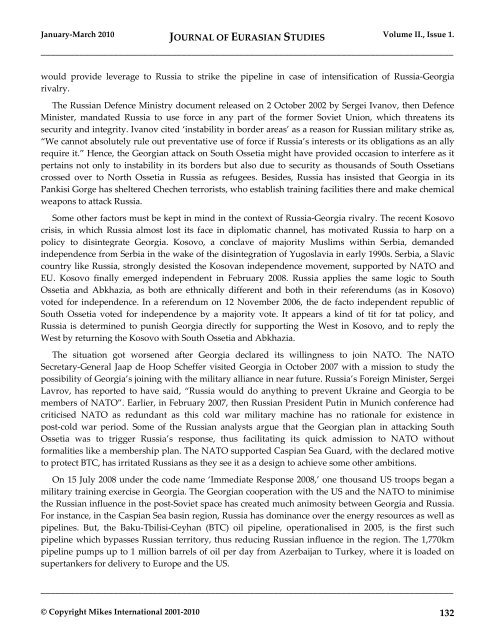EurasianStudies_0110..
EurasianStudies_0110..
EurasianStudies_0110..
Create successful ePaper yourself
Turn your PDF publications into a flip-book with our unique Google optimized e-Paper software.
January-March 2010 JOURNAL OF EURASIAN STUDIES Volume II., Issue 1.<br />
_____________________________________________________________________________________<br />
would provide leverage to Russia to strike the pipeline in case of intensification of Russia-Georgia<br />
rivalry.<br />
The Russian Defence Ministry document released on 2 October 2002 by Sergei Ivanov, then Defence<br />
Minister, mandated Russia to use force in any part of the former Soviet Union, which threatens its<br />
security and integrity. Ivanov cited ‘instability in border areas’ as a reason for Russian military strike as,<br />
“We cannot absolutely rule out preventative use of force if Russia’s interests or its obligations as an ally<br />
require it.” Hence, the Georgian attack on South Ossetia might have provided occasion to interfere as it<br />
pertains not only to instability in its borders but also due to security as thousands of South Ossetians<br />
crossed over to North Ossetia in Russia as refugees. Besides, Russia has insisted that Georgia in its<br />
Pankisi Gorge has sheltered Chechen terrorists, who establish training facilities there and make chemical<br />
weapons to attack Russia.<br />
Some other factors must be kept in mind in the context of Russia-Georgia rivalry. The recent Kosovo<br />
crisis, in which Russia almost lost its face in diplomatic channel, has motivated Russia to harp on a<br />
policy to disintegrate Georgia. Kosovo, a conclave of majority Muslims within Serbia, demanded<br />
independence from Serbia in the wake of the disintegration of Yugoslavia in early 1990s. Serbia, a Slavic<br />
country like Russia, strongly desisted the Kosovan independence movement, supported by NATO and<br />
EU. Kosovo finally emerged independent in February 2008. Russia applies the same logic to South<br />
Ossetia and Abkhazia, as both are ethnically different and both in their referendums (as in Kosovo)<br />
voted for independence. In a referendum on 12 November 2006, the de facto independent republic of<br />
South Ossetia voted for independence by a majority vote. It appears a kind of tit for tat policy, and<br />
Russia is determined to punish Georgia directly for supporting the West in Kosovo, and to reply the<br />
West by returning the Kosovo with South Ossetia and Abkhazia.<br />
The situation got worsened after Georgia declared its willingness to join NATO. The NATO<br />
Secretary-General Jaap de Hoop Scheffer visited Georgia in October 2007 with a mission to study the<br />
possibility of Georgia’s joining with the military alliance in near future. Russia’s Foreign Minister, Sergei<br />
Lavrov, has reported to have said, “Russia would do anything to prevent Ukraine and Georgia to be<br />
members of NATO”. Earlier, in February 2007, then Russian President Putin in Munich conference had<br />
criticised NATO as redundant as this cold war military machine has no rationale for existence in<br />
post-cold war period. Some of the Russian analysts argue that the Georgian plan in attacking South<br />
Ossetia was to trigger Russia’s response, thus facilitating its quick admission to NATO without<br />
formalities like a membership plan. The NATO supported Caspian Sea Guard, with the declared motive<br />
to protect BTC, has irritated Russians as they see it as a design to achieve some other ambitions.<br />
On 15 July 2008 under the code name ‘Immediate Response 2008,’ one thousand US troops began a<br />
military training exercise in Georgia. The Georgian cooperation with the US and the NATO to minimise<br />
the Russian influence in the post-Soviet space has created much animosity between Georgia and Russia.<br />
For instance, in the Caspian Sea basin region, Russia has dominance over the energy resources as well as<br />
pipelines. But, the Baku-Tbilisi-Ceyhan (BTC) oil pipeline, operationalised in 2005, is the first such<br />
pipeline which bypasses Russian territory, thus reducing Russian influence in the region. The 1,770km<br />
pipeline pumps up to 1 million barrels of oil per day from Azerbaijan to Turkey, where it is loaded on<br />
supertankers for delivery to Europe and the US.<br />
_____________________________________________________________________________________<br />
© Copyright Mikes International 2001-2010 132

















